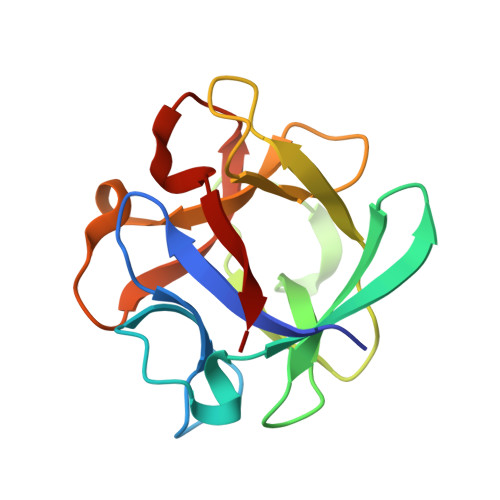Cocaprins, beta-Trefoil Fold Inhibitors of Cysteine and Aspartic Proteases from Coprinopsis cinerea.
Renko, M., Zupan, T., Plaza, D.F., Schmieder, S.S., Perisic Nanut, M., Kos, J., Turk, D., Kunzler, M., Sabotic, J.(2022) Int J Mol Sci 23
- PubMed: 35563308
- DOI: https://doi.org/10.3390/ijms23094916
- Primary Citation of Related Structures:
7ZNX - PubMed Abstract:
We introduce a new family of fungal protease inhibitors with β-trefoil fold from the mushroom Coprinopsis cinerea , named cocaprins, which inhibit both cysteine and aspartic proteases. Two cocaprin-encoding genes are differentially expressed in fungal tissues. One is highly transcribed in vegetative mycelium and the other in the stipes of mature fruiting bodies. Cocaprins are small proteins (15 kDa) with acidic isoelectric points that form dimers. The three-dimensional structure of cocaprin 1 showed similarity to fungal β-trefoil lectins. Cocaprins inhibit plant C1 family cysteine proteases with K i in the micromolar range, but do not inhibit the C13 family protease legumain, which distinguishes them from mycocypins. Cocaprins also inhibit the aspartic protease pepsin with K i in the low micromolar range. Mutagenesis revealed that the β2-β3 loop is involved in the inhibition of cysteine proteases and that the inhibitory reactive sites for aspartic and cysteine proteases are located at different positions on the protein. Their biological function is thought to be the regulation of endogenous proteolytic activities or in defense against fungal antagonists. Cocaprins are the first characterized aspartic protease inhibitors with β-trefoil fold from fungi, and demonstrate the incredible plasticity of loop functionalization in fungal proteins with β-trefoil fold.
Organizational Affiliation:
Department of Biochemistry and Molecular and Structural Biology, Jožef Stefan Institute, 1000 Ljubljana, Slovenia.














